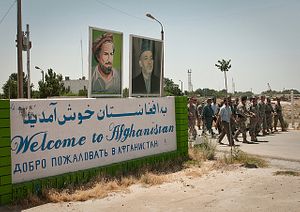Mohammad Hanif Atmar, Afghan President Ashraf Ghani’s national security adviser, has been bouncing around Central Asia in recent weeks. While attention in Afghanistan has shifted to intensified political squabbling and the deterioration of Helmand, the country’s north has also remained unstable. The border between Afghanistan and Central Asia–shared by Turkmenistan, Uzbekistan, and Tajikistan–has long been a point of concern for the region.
Atmar accompanied Ghani to Tashkent in late June for the Shanghai Cooperation Organization summit. Afghanistan is an observer in the SCO, but the annual leaders’ summit presents an ideal opportunity to touch base with all of the Central Asian states. Even Turkmenistan’s President Gurbanguly Berdimuhamedov attended, though Turkmenistan is neither a member nor an observer in the SCO. Not much was said about who Atmar met with while in Tashkent but surely the border was discussed in sideline meetings between the Afghans and the Pakistanis as well as meetings with the Central Asian states.
In recent weeks Atmar has headed delegations to Tajikistan and Kyrgyzstan.
On August 11, Atmar touched down in Tajikistan to meet with President Emomali Rahmon. According to Asia Plus, the two discussed combating terrorism, extremism, and drug trafficking. Rahmon, Asia Plus reported, in particular “noted that the main criterion ensuring further expansion of cooperation between Tajikistan and Afghanistan was the principle of good-neighborliness and added that cooperation with Afghanistan was one of [the] priorities of Tajikistan’s foreign policy.”
Atmar’s visit to Kyrgyzstan a day later was relatively quiet. Kabar reported that on August 12 an Afghan delegation, led by Atmar, met with the interior minister, Kashkar Dzhunushaliyev. Dzhunushaliyev, a career police officer, only recently took up the head spot at the Interior Ministry after the former minister resigned following a spate of arrests of politicians accused of plotting a coup. The Afghans discussed “the operational situation in Afghanistan and Kyrgyzstan in fighting against international terrorism, drug trafficking, and cross-border crime, cooperation in the sphere of security, [and] counterterrorism” with the Kyrgyz.
Terrorism, extremism, and drug trafficking are perpetual issues between Central and South Asia. They’ve garnered more attention due to the deterioration of stability in Afghanistan’s north. That deterioration was epitomized by the brief seizure of Kunduz last September by the Taliban. For much of the U.S. war in Afghanistan, the south of the country was considered the Taliban’s stronghold and the north, where the remnants of the mujahideen had held out, was relatively calmer. But that assumption, that the north was stable, has fallen away and with it fears along the border have increased.
When the NATO combat mission in Afghanistan ended at the close of 2014–with the follow-on mission dubbed Resolute Support and the main battle to be headed by the Afghans themselves–the countries of Central Asia were worried. Central Asia’s place in international relations has been largely defined in the past decade via its proximity to Afghanistan. With Central Asians viewing Afghanistan as a source of instability, cooperation between the two regions has been uneven. But as the U.S. presence in Afghanistan continues to downsize (ever so slowly), it’s imperative for the regional capitals to take the lead. Quiet visits, like those of Atmar recently to Dushanbe and Bishkek, are a positive sign–but the two regions need to do more than talk.
































